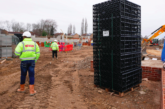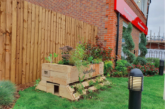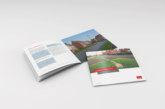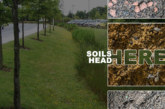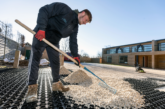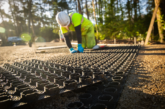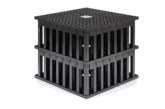
In January this year, the Government published plans to make the incorporation of sustainable drainage systems (SuDS) mandatory in new developments in England.
This is a result of a review into the implementation of schedule 3 to The Flood and Water Management Act 2010. The aim of SuDs is to reduce the risk of surface water flooding, pollution and help alleviate the pressures on traditional drainage and sewerage systems. Given that the term ‘SuDs’ has been bandied about for many years, and that we have been experiencing an alarming increase in flooding events in recent years, it is perhaps surprising that the incorporation of SuDs in new developments is not already mandated in England (as it is in Wales). However, that is all set to change, with the Department for Environment, Food and Rural Affairs (Defra) consulting on the proposals later this year and planning to implement them in 2024.
What are SuDS?
Many of us are aware of the term ‘SuDS’ and that it’s something we should be doing more of collectively, but how many of us could accurately explain what they are and how they work? SuDs are essentially alternative solutions to the direct draining of surface water through networks of pipes and sewer systems to nearby watercourses. Instead, they imitate how water would dissipate in nature, gradually soaking into the ground over time, replenishing groundwater regimes and aquifers, rather than bypassing them (which leads to water shortages). SuDS come in various forms – a few examples are swales, infiltration basins, wet ponds, filter drains, soakaways and the incorporation of permeable hard landscaping.
How this affects the installation of driveways
For many years, driveways (and other surfaces) have been landscaped with impermeable materials such as asphalt or concrete. At times of sudden heavy rainfall, which we are seeing increasingly, water flows off these surfaces very quickly, flowing into gullies or channels which lead to traditional drainage systems. Whilst these systems served us well when they were built, our societies have now industrialised and urbanised to a point where these systems are struggling to cope at times of peak rainfall. Much of the land on which our towns and cities are based is covered with impermeable hard landscaping, and it is not surprising that the sheer volume of water run-off often overwhelms drainage systems, leading to flooding, damage, and the pollution of watercourses. Around 325,000 English properties are currently at high risk of flooding caused by heavy rainfall and that number is set to increase over the coming decades. Flooding causes major disruption to people’s lives and livelihoods and sometimes even loss of life.
Use permeable materials for driveways
For many housebuilders, architects and contractors, asphalt or block paving have been the common default materials for driveways in housing projects. But this may change when Schedule 3 makes the incorporation of SuDS mandatory. Whilst asphalt and block paving can be made ‘SuDs-compliant’, it is an expensive and work-intensive option. It’s better to have a completely porous surface area rather than an expensive SuDs-compliant workaround (which may well eventually direct some or all the run-off to the drainage system anyway). Using a genuine permeable material such as gravel is a far simpler and more effective option.
Gravel retention systems
Many homeowners still have the perception that ‘gravel is ok but it moves around and can end up indoors’. However, gravel retention systems have changed all that. Beauxfort was the first to market with its clever ‘Gravelrings’ grid system which locks the gravel into cells, preventing migration and providing a durable, stable surface. The grid system is made from recycled HDPE and has a mesh-backed base, which means that water can permeate and soak into the ground below, making it a much more environmentally friendly option. Installation is quick and easy and requires less gravel than competing systems. Given all the benefits of the Gravelrings system, it will soon become difficult to justify using more expensive, labour-intensive materials.
The adoption of SuDs benefits us all
As a natural drainage solution, SuDS boast a wealth of benefits for local communities and the environment alike. It is only a matter of time before the incorporation of SuDs becomes mandatory across England and the hope is that it will make a significant difference in urban areas that have experienced destructive sudden flood events. Fortunately, as well as being the right thing to do environmentally, the cost benefits of using permeable surfaces instead of impermeable ones are clear, making this an easy swap to make. We can expect the SuDs philosophy to become the norm rather than the exception within the next few years. It makes sense to be ahead of the curve and start incorporating them on a voluntary basis as well as enjoying the savings they can deliver sooner rather than later.
To discuss how Beauxfort can help you find the right driveway system for your project contact us by phone at 0330 055 2599 or email info@beauxfort.com. Additionally, order a free sample of Gravelrings gravel retention system to see the unique design of this innovative system.

